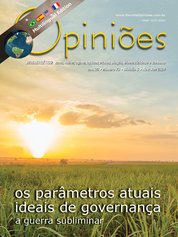Evandro Gussi
CEO da UNICA - União da Indústria de Cana-de-Açúcar e Bioenergia
OpAA78
Cooperação: o caminho para a transição energética
Ao lado de Estados Unidos e Índia, o Brasil faz parte da lista de países fundadores da Aliança Global de Biocombustíveis (GBA). O grupo foi lançado em setembro desse ano, durante a reunião de cúpula do G20, em Nova Delhi, e conta com 19 países, além de mais de uma dezena de organizações internacionais.
A missão da aliança é fomentar o uso de biocombustíveis no mundo, para atender aos compromissos assumidos pelo mundo no Acordo de Paris, no sentido de conter o aquecimento global e seus efeitos. A estratégia da aliança é criar um “cinturão de bio-
energia” na zona tropical, para disseminar a produção e o consumo dos biocombustíveis, com ênfase para o etanol, biodiesel, biometano e bioquerosene de aviação.
Nesse audacioso projeto, o Brasil ocupa uma posição de destaque. Para além de um lugar de referência na nova geopolítica energética global, temos a missão de ajudar os países, especialmente os do Sul Global, a trilhar um caminho no sentido de oferecer e garantir o abastecimento de uma energia sustentável.
Esse pedaço do planeta, conhecido por Sul Global, reúne cerca de 3 bilhões de pessoas, que podem ser beneficiadas pela descarbonização de seus países com a adoção dos biocombustíveis. Para isso, é fundamental que tenhamos um trabalho de cooperação global para dar tração a essa que será uma das rotas de carbonização adotadas pelo mundo.
Nosso papel é levar ao mundo o sucesso que já conseguimos, em mais de 40 anos de experiência no uso de etanol em nossa frota, demonstrando ser possível ter uma mobilidade sustentável, eficiente e mais barata para as populações de muitos países.
Conseguimos dominar a tecnologia do etanol do campo à indústria automobilística. Desenvolvemos o motor flex e chegamos aos veículos híbridos flex. Esses últimos, abastecidos 100% a etanol, possuem uma emissão equivalente aos carros elétricos que rodam no Brasil. Ao longo do tempo, alcançamos um patamar digno de admiração.
A própria Aliança Global é consequência do reconhecimento que o Brasil tem recebido no tema dos biocombustíveis, especialmente, pelo exitoso compartilhamento da nossa experiência feita com a Índia, com efeitos impressionantes por lá. Já os inspiramos a elevar a mistura de etanol na gasolina de 2% para os atuais 10%. E que chegará a 20% em dois anos.
Mas a aliança dos países não se restringe ao transporte terrestre. Seria impossível deixar de fora desse debate o que está por vir na aviação. A Organização Internacional da Aviação Civil (ICAO) estipulou para 2050 a meta de Net Zero a todos os seus membros.
Segundo a Associação Internacional de Transporte Aéreo (Iata, em inglês), 65% do corte de emissão da aviação virá da substituição do combustível fóssil, atualmente utilizado nas aeronaves, pelo Combustível Sustentável de Aviação (SAF, na sigla em inglês). No ano passado, a produção global de SAF alcançou 300 milhões de litros, uma fração dos 450 bilhões de litros necessários para atender a demanda da indústria em 2050.
Para não ir tão longe, Estados Unidos e Europa discutem a adoção de 5% de SAF ao querosene fóssil até 2026. Se aprovada, a demanda iminente de SAF seria da ordem de 20 bilhões de litros. Nem todo o etanol do Brasil seria suficiente para atender a essa demanda.
Como se vê, o desafio não é pequeno. As preocupações das diferentes esferas públicas, em relação à capacidade de seus sistemas políticos agirem de forma efetiva e decisiva no sentido de resolver o problema do aquecimento global e da mudança do clima, são evidentes. Será necessário que os países implementem sistemas de governança eficientes, capazes de manter a iniciativa da Aliança Global, não como um projeto de governo, mas como um projeto de Estado.
Por aqui, o governo federal já sinalizou que o Brasil não se furtará a encarar os desafios conhecidos e aqueles que ainda surgirão. Na pessoa do ministro de Minas e Energia, Alexandre Silveira, o Governo Federal abraçou a causa dos biocombustíveis e da aliança global, levando ao mundo as possibilidades de geração de emprego e renda, menor preço ao consumidor e diminuição da pegada de carbono no setor de transportes.
Mas, já fomos além. Se um dos significados de governança é dar direcionamento, seja na esfera público ou privada, há temas que trarão impactos coletivos, o programa Combustível do Futuro é um exemplo claro disso. O projeto de lei, assinado pelo presidente Lula e já encaminhado ao Congresso Federal, endereça temas fundamentais para o futuro da mobilidade e reconhece o papel determinante que os biocombustíveis desempenharam no País.
Ancorado no que há de mais avançado, em termos de ciência, o Brasil construiu um programa de transição energética, que ouviu todas as expressões da sociedade civil, com espaço para empresários e trabalhadores darem suas contribuições. Já chegamos aonde o mundo ainda almeja estar – e estará – em alguns anos.
Temos a responsabilidade de levar outras nações, especialmente, as que ainda não experimentaram os frutos do desenvolvimento nesse caminho. Temos tudo para oferecer ao Sul Global um modelo de liderança e governança baseada em exemplo e cooperação. A Aliança Global de Biocombustíveis, pela forma como foi estruturada e pela busca do bem coletivo, é a oportunidade que temos de ocupar o lugar da já tão desgastada luta por hegemonia.




